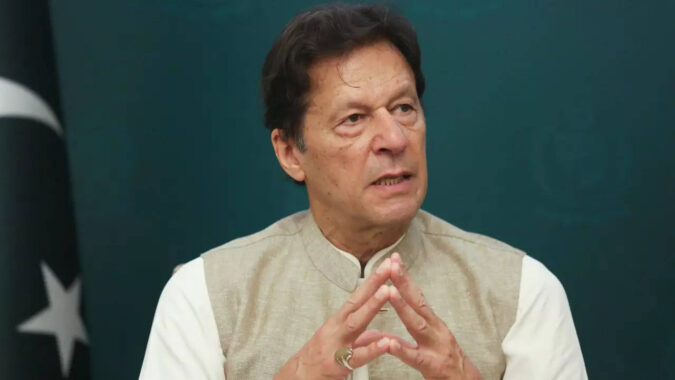ISLAMABAD: Pakistan’s army criticized former premier Imran Khan for accusing one of their senior officials of orchestrating assassination attempts against him and challenged the ex-cricket star to address the matter in court.
Khan, 70, used a rally over the weekend to accuse the military of being behind at least two attempts to murder him, focusing on the alleged involvement of a senior official from the Inter-Service Intelligence, or ISI, which oversees Pakistan’s internal security.
The politician is agitating for early elections after getting ousted in April 2022 in a no-confidence vote. Emboldened by strong support in opinion polls and rallies, Khan has shown no signs of backing down against the government and the army and is seeking support from the Supreme Court to hold polls in two provinces for a start.
“This has been a consistent pattern for the last one year where military and intelligence agencies officials are targeted with insinuations and sensational propaganda for the furtherance of political objectives,” the military said in a rare statement directed at Khan late Monday. It asked for the allegations to be addressed in court.
This is not the first time Khan has made these claims. After a shooting incident in rally last year that left him injured in the leg, Khan held Prime Minister Shehbaz Sharif, Interior Minister Rana Sanaullah and senior military officials responsible. They have denied involvement.
Khan’s allegations stem from Pakistan’s own history where no prime minister has served a full five-year term in office. Many who lasted more than two years were either exiled or killed, including Benazir Bhutto, who was assassinated in December 2007 during a campaign stop in an attack similar to the one against Khan in November.
The military said it reserved the right to take legal action against what it called malafide statements and propaganda. If the military brings Khan to court, it would add to the several dozens of cases that Khan is currently fighting in court, including a case alleging he hid earnings from a sale state gifts acquired during his time in office.
The Pakistan military wields an outsized influence over politics as well as foreign and security affairs, having directly ruled the nuclear-armed nation for half of its history since its creation in 1947. Most prime ministers have depended on the support of the military to stay in power, including Khan, but last year an army spokesman said the institution has decided to stay apolitical and function within the constitution.
Khan’s attempts to control military promotions have been at the root of Pakistan’s long-running political tensions. In late 2021, Khan publicly opposed the then-army chief’s choice to lead the spy agency, voicing support for one of his own allies to stay in the role. The army chief eventually got his way, but the incident sowed the seeds for Khan’s ouster six months later.
Khan, 70, used a rally over the weekend to accuse the military of being behind at least two attempts to murder him, focusing on the alleged involvement of a senior official from the Inter-Service Intelligence, or ISI, which oversees Pakistan’s internal security.
The politician is agitating for early elections after getting ousted in April 2022 in a no-confidence vote. Emboldened by strong support in opinion polls and rallies, Khan has shown no signs of backing down against the government and the army and is seeking support from the Supreme Court to hold polls in two provinces for a start.
“This has been a consistent pattern for the last one year where military and intelligence agencies officials are targeted with insinuations and sensational propaganda for the furtherance of political objectives,” the military said in a rare statement directed at Khan late Monday. It asked for the allegations to be addressed in court.
This is not the first time Khan has made these claims. After a shooting incident in rally last year that left him injured in the leg, Khan held Prime Minister Shehbaz Sharif, Interior Minister Rana Sanaullah and senior military officials responsible. They have denied involvement.
Khan’s allegations stem from Pakistan’s own history where no prime minister has served a full five-year term in office. Many who lasted more than two years were either exiled or killed, including Benazir Bhutto, who was assassinated in December 2007 during a campaign stop in an attack similar to the one against Khan in November.
The military said it reserved the right to take legal action against what it called malafide statements and propaganda. If the military brings Khan to court, it would add to the several dozens of cases that Khan is currently fighting in court, including a case alleging he hid earnings from a sale state gifts acquired during his time in office.
The Pakistan military wields an outsized influence over politics as well as foreign and security affairs, having directly ruled the nuclear-armed nation for half of its history since its creation in 1947. Most prime ministers have depended on the support of the military to stay in power, including Khan, but last year an army spokesman said the institution has decided to stay apolitical and function within the constitution.
Khan’s attempts to control military promotions have been at the root of Pakistan’s long-running political tensions. In late 2021, Khan publicly opposed the then-army chief’s choice to lead the spy agency, voicing support for one of his own allies to stay in the role. The army chief eventually got his way, but the incident sowed the seeds for Khan’s ouster six months later.
